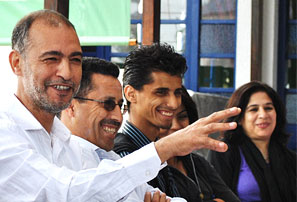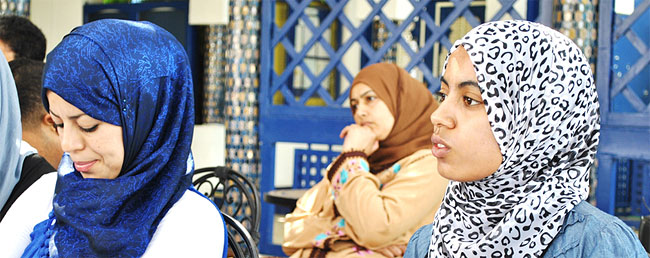The Literary Conference: Agadir, Morocco - Day 2
There is an inherent problem in my being here, in Agadir, a town on the coast of central Morocco, to cover and participate in a literary conference. The theme of the conference is space and I am not from this place, have never been to this part of the world [1], and do not speak the language spoken here, my tongue unable to articulate, my mind unable to decipher, the fluid warblings of Arabic. I was not told until I arrived that the conference would be entirely in Arabic and there were no official translators on hand.
Some of the time, I was able to get people to take notes for me, to whisper what was going on as the conversation continued around us. “They’re talking about villages,” Salma said, at one point. “Now they’re talking about revolution.”
Occasionally, I was able to let my mind wander along what I believe might have been a path remotely resembling the one the speaker was marking out. Guided by signposts I recognized – Proust, Kafka, Marquez – I started thinking about space imposing isolation and solitude, unending labyrinths and how memory recreates space.

Perhaps my being here, a foreigner, an utter outsider to this place, this language and this culture – I am one of two women participating, and we two are two of four not wearing headscarves (there are about 15 women in the audience of a total of about 60) – is relevant to the theme of the conference. I am not referring to the long and convoluted history of the relationship between the Self and the Other, the local and the foreigner, the colonizer and colonized; I mean only that, in this case, the outsider sees things differently, without the same limits.
When it is my turn to speak, I introduce myself in French, apologetic and defiant. I bring up the idea of the foreigner in Arabic literature, and the role of the visitor or the expatriate as either creator or subject. This is the only truthful thing I can discuss. Having just read the first part of Lawrence Durrell’s Alexandria Quartet, Justine, I was wondering whether the narrator, a British man, sees things more truthfully, or at least more acutely, for the distance his outsider’s perspective provides.  Or does this foreignness lead to the undesirable (and terribly passé) “exoticizing” of his subject: the city of Alexandria and its inhabitants? Sometimes it takes a foreigner to observe a place, to be fascinated and enchanted by everything he sees. Henry Miller said that only painters can see their subjects with loving eyes, and the writer is cursed to perversion, or at least pessimism, when depicting the world. Lawrence Durrell loves what he sees and is enchanted by what he experiences.
Or does this foreignness lead to the undesirable (and terribly passé) “exoticizing” of his subject: the city of Alexandria and its inhabitants? Sometimes it takes a foreigner to observe a place, to be fascinated and enchanted by everything he sees. Henry Miller said that only painters can see their subjects with loving eyes, and the writer is cursed to perversion, or at least pessimism, when depicting the world. Lawrence Durrell loves what he sees and is enchanted by what he experiences.
Ibrahim Abdel-Meguid, born and raised in Alexandria, brings up the imagination: the Alexandria that Durrell creates is wholly imaginative even in the writer’s own words. The lives he writes about are lives based on selected fictions and memories distorted by loneliness and lost love. Synonyms for lost: misplaced, disoriented, vanished, bemused, bewildered, forlorn, helpless, spellbound, at sea.
The city, half-imagined (yet wholly real), begins and ends in us, roots lodged in our memory. Why must I return to it night after night, writing here by the fire of carob-wood while the Aegean wind clutches at this island house, clutching and releasing it, bending back the cypresses like bows? Have I not said enough about Alexandria? Am I to be reinfected once more by the dream of it and the memory of its inhabitants? Dreams I had thought safely locked on paper, confined to the strong-rooms of memory!
– Balthazar, Lawrence Durrell (second instalment in The Alexandria Quartet)
The village in Arabic literature
Mohamed Azeddin Tazi, novelist, and Mohamed At Iaâmim, critic, believe that the lack of novels representing Arabic villages and villagers comes foremost from the inability to portray these subjects without a sense of pity that prevents readers from truly empathizing with the story.

The question hangs: Is it possible to write a story depicting a village in a way that is both honest and interesting?
I saw Canadian writer Alistair McLeod discuss his work a few years ago in Halifax, Nova Scotia. In the auditorium at the University of King’s College, McLeod talked about the small Maritime villages he depicts in his novels and short stories. One of his largest readerships is in East Asia, he said, proving that people don’t need to be from a place to be interested in that place; as long as the story truthfully depicts relationships, life and the human condition, people are able to relate to it. Nobody here has ever heard of Alistair McLeod.
Several people approach me after the discussion, downright befuddled about my identity, my role. “You’re not from here? You don’t speak Arabic? But you were taking notes all throughout,” they say, “and you looked so attentive.”
“I thought you were a writer too,” I reply, “don’t you take notes and look attentive, too?”
[1] My African tourism has taken me only so far south as Marrakesh, as east as Essaouira.

{ 3 comments… read them below or add one }
it is a pleaser to have someone who is interested in our country. all guest are welcoming .
When I originally commented I clicked the -Notify me when new comments are added- checkbox and now each time a comment is added I get four emails with the same comment. Is there any way you can remove me from that service? Thanks!
Thanks for your comment! To subscribe to our newsletter you can add your email address to the column on the right margin, below the “donate” button. If you have any difficulty with that, just email halifaxroyalmajesty@gmail.com and we will add you to the list.
You must log in to post a comment.